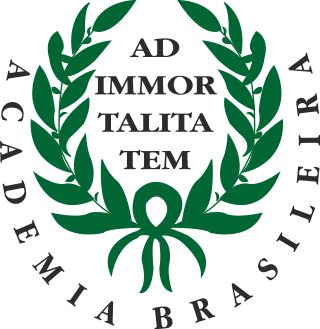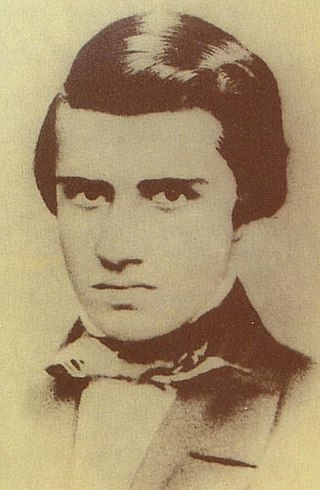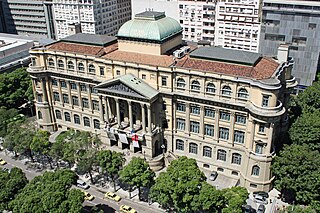Related Research Articles

Brazilian literature is the literature written in the Portuguese language by Brazilians or in Brazil, including works written prior to the country's independence in 1822. Throughout its early years, literature from Brazil followed the literary trends of Portugal, gradually shifting to a different and authentic writing style in the course of the 19th and 20th centuries, in the search for truly Brazilian themes and use of Brazilian forms.

The Academia Brasileira de Letras is a Brazilian literary non-profit society established at the end of the 19th century. The first president, Machado de Assis, declared its foundation on Tuesday, 15 December 1896, with the by-laws being passed on Thursday, 28 January 1897. On Tuesday, 20 July of the same year, the academy started its operation.

Macunaíma is a 1969 Brazilian comedy film directed by Joaquim Pedro de Andrade, based on Mário de Andrade's novel of the same name. It was released in a dubbed version for American audiences in 1972 by New Line Cinema. On June 13 and July 12, 2005, European and Latin American syndicates of the TV5 network aired the film in its original Portuguese with French subtitles. It was rereleased internationally in 2009.
The Universal Church of the Kingdom of God is an international Evangelical Neo-charismatic Christian denomination with its headquarters at the Temple of Solomon in São Paulo, Brazil. The church was founded in 1977 in Rio de Janeiro by Bishop Edir Macedo, who is the owner of the multi-billion television company RecordTV.

Manuel Antônio Álvares de Azevedo, affectionately called "Maneco" by his close friends, relatives and admirers, was a Brazilian Romantic poet, short story writer, playwright and essayist, considered to be one of the major exponents of Ultra-Romanticism and Gothic literature in Brazil. His works tend to play heavily with opposite notions, such as love and death, platonism and sarcasm, sentimentalism and pessimism, among others, and have a strong influence of Musset, Chateaubriand, Lamartine, Goethe and – above all – Byron.

Joaquim Manuel de Macedo was a Brazilian novelist, medical doctor, teacher, poet, playwright and journalist, famous for the romance A Moreninha. He is considered the first Brazilian novelist.

Manuel José de Araújo Porto-Alegre, Baron of Santo Ângelo, was a Brazilian Romantic writer, painter, architect, diplomat and professor, considered to be one of the first Brazilian editorial cartoonists ever. He is the patron of the 32nd chair of the Brazilian Academy of Letters.
A Luneta Mágica is a 1869 novel written by Brazilian Romantic writer Joaquim Manuel de Macedo. It is considered to be one of the first Brazilian fantastic novels ever, comparable to the works of E. T. A. Hoffmann.
O moço loiro is a novel written by the Brazilian writer Joaquim Manuel de Macedo. It was first published in 1845.
Joaquim is the Portuguese and Catalan version of Joachim and may refer to:

Several years after the Portuguese first explored Brazil, French traders in search of pau-brasil reached the rich area extending from the Cape Frio coast to the beaches and islands of Guanabara Bay, the economic and, above all, strategic importance of which was already well-known.

Joaquim José Inácio, Viscount of Inhaúma, was a naval officer, politician and monarchist of the Empire of Brazil. He was born in the Kingdom of Portugal, and his family moved to Brazil two years later. After Brazilian independence in 1822, Inhaúma enlisted in the Brazilian navy. Early in his career during the latter half of the 1820s, he participated in the subduing of secessionist rebellions: first the Confederation of the Equator, and then the Cisplatine War, which precipitated a long international armed conflict with the United Provinces of the Río de la Plata.

The history of the book in Brazil focuses on the development of the access to publishing resources and acquisition of the book in the country, covering a period extending from the beginning of the editorial activity during colonization to today's publishing market, including the history of publishing and bookstores that allowed the modern accessibility to the book.

Brazilian science fiction has been a part of Brazilian literature since the mid 19th century. The first works of Brazilian Science Fiction emerged in the decades following Brazil's independence. Brazilian science fiction has its roots in authors such as Augusto Emílio Zaluar in the novel O Doutor Benignus and Machado de Assis in the short story O Imortal (1882). The genre grew in popularity over the 20th century, reaching its first “golden age” in the late 1950s, bolstered by the work of publisher Gumercindo Rocha Dorea. Following the end of the military dictatorship in 1985, the genre has witnessed a renaissance, with an influx of new writers and diverse influences reshaping the genre.

Daniel Costa Teixeira de Souza, stage name Daniel Satti is a Brazilian film and television actor. He is known for roles in various Brazilian telenovelas such as Salve-se Quem Puder (2020), Novo Mundo (2017), Os Dez Mandamentos (2015), Carrossel (2012), among others, and also for the awarded short film Entreolhares (2020).
A Morgadinha dos Canaviais is a 1949 Portuguese film directed by Caetano Bonucci and Amadeu Ferrari, featuring Eunice Muñoz as Madalena and Maria Matos as Vitória.
A Moreninha may refer to:
The 2022–23 Taça da Liga was the sixteenth edition of the Taça da Liga, a football league cup competition organised by the Liga Portuguesa de Futebol Profissional and contested exclusively by clubs competing in the top two professional tiers of Portuguese football – the Primeira Liga and the Liga Portugal 2.
References
- ↑ "Joaquim Manuel de Macedo". Academia Brasileira de Letras (in Brazilian Portuguese). Retrieved 2022-06-01.
- ↑ "FILMOGRAFIA - A MORENINHA". 2016-09-23. Archived from the original on 23 September 2016. Retrieved 2022-06-01.